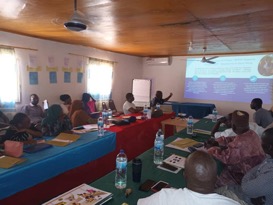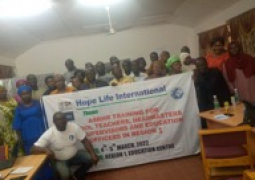
The training focuses on the significance and need for fortification of the food chain which includes rice, wheat flour, oil and iodine salt to strengthen and improve the health of consumers which includes children, breastfeeding mothers among others. The training is being held at Ding Ding Bantaba Lodge in Bwiam.
NaNA serves as the coordinating institution for the implementation of the Food Fortification Programs and policies which include both industrial and bio-fortification. Participants are from Maruo Farms, NARI, the media, FSQA, among others.
The training followed the development and pre-testing of the Large-Scale Food Fortification Social and Behavioral Change Communication (SBCC) materials.
The overall objective of the training includes skills development to be able to apply Social Behavioral Change Communication (SBCC) and Interpersonal Communication (IPC) effectively in their work.
It is also expected to help increase IPC network members’ understanding of the role of SBCC in the effective implementation of the LSFF project in The Gambia, how to use the SBCC in the implementation of the LSFF project in The Gambia, the significance of good IPC, and how to use effective IPC skills in their work.
The training further aims to equip participants on how to use communication skills in their community interaction, advocacy and social mobilisation as well as on how to effectively use all or some elements of the tools in their work.
The training facilitated by NaNA received additional funding from the Large Scale Food Fortification Project through the United States Conference of Catholic Bishops (CRS) the Gambia Country Program (CP) to build the capacity of the implementing partners and stakeholders on the use of the SBCC materials.
At the end of the training, participants are expected to prescribe principles of adult learning as well as recognise why it is significant to understand and use adult learning principles.
The convergence is also expected to help them manage the behaviours in adults in a learning environment and describe ways to incorporate adult learning principles to maximise the effectiveness of training delivery.
Participants were also exposed to the skills of interpersonal communication, small group communication, organisational communication and the media.
The training also availed participants the opportunity to know the types of food commodities to be fortified (rice, flour, oil and salt.)





